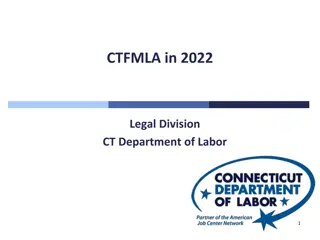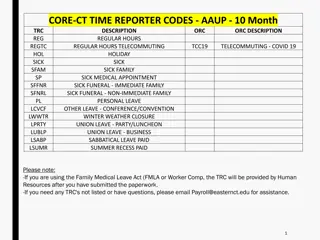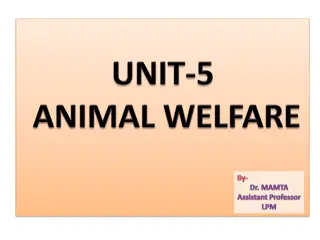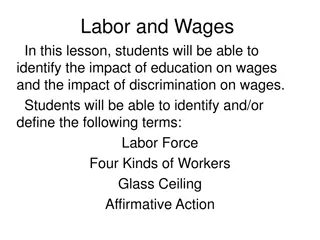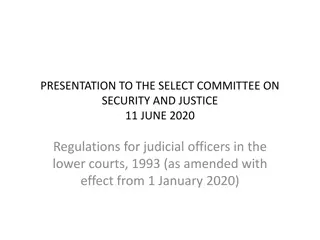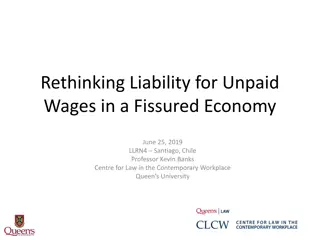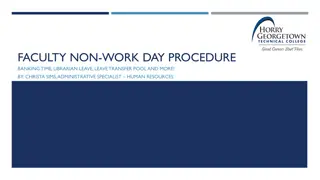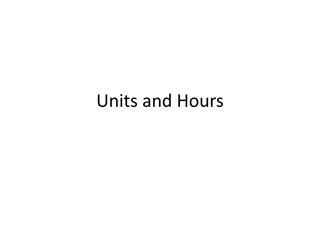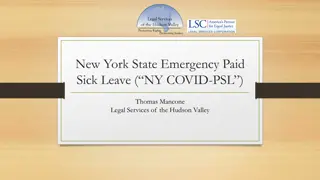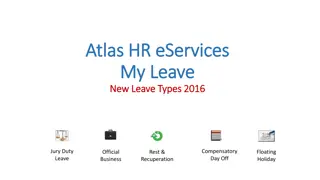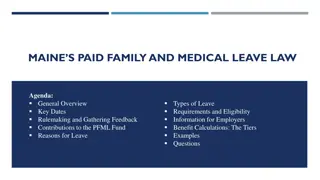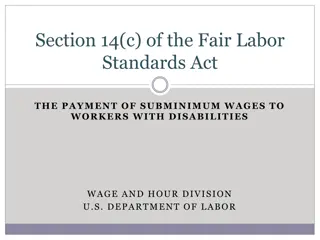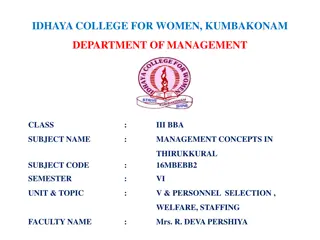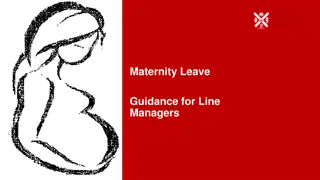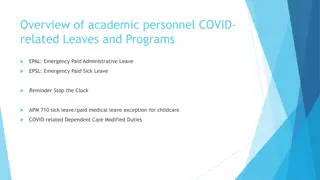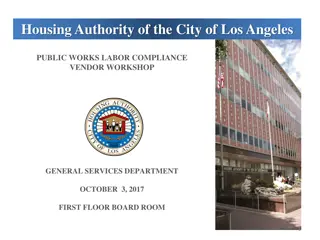The Factories Act 1948 - Welfare, Working Hours, and Annual Leave with Wages
The Factories Act 1948 encompasses welfare provisions for workers, including washing facilities, storage for clothing, sitting arrangements, first-aid provisions, canteens, shelters, and more. It mandates basic amenities to ensure the well-being of workers in factories.
Download Presentation

Please find below an Image/Link to download the presentation.
The content on the website is provided AS IS for your information and personal use only. It may not be sold, licensed, or shared on other websites without obtaining consent from the author. Download presentation by click this link. If you encounter any issues during the download, it is possible that the publisher has removed the file from their server.
E N D
Presentation Transcript
THE FACTORIES ACT 1948 WELFARE, WORKING HOURS AND ANNUAL LEAVE WITH WAGES
WELFARE PROVISIONS (Sec 42 -49) Washing facilities (Sec 42): adequate and suitable facilities for washing Separate for the use of male and female workers conveniently accessible and shall be kept clean Facilities for storing and drying clothing (Sec 43) The State Govt may make rule for the provision therein of suitable places for keeping clothing not worn during working hours and for the drying of wet clothing Facilities for sitting (Sec 44) suitable arrangements for sitting - obliged to work in a standing position, take advantage of any opportunities for rest which may occur in the course of their work
Contd.. First-aid appliances (Sec 45) first-aid boxes or cupboards equipped with the prescribed contents one for every one hundred and fifty workers ordinarily employed kept in the charge of a separate responsible person who holds a certificate in first-aid treatment recognized by the State Government and who shall always be readily available during the working hours of the factory more than five hundred workers are ordinarily employed - an ambulance room of the prescribed size, containing the prescribed equipment and in the charge of such medical and nursing staff as may be prescribed Canteens (Sec 46) more than two hundred and fifty workers are ordinarily employed
Contd.. The State Government may make rules requiring, the date by which such canteen shall be provided; the standards in respect of construction, accommodation, furniture and other equipment of the canteen; the foodstuffs to be served therein and the charges which may be made therefor; the constitution of a managing committee for the canteens and representation of the workers in the management of the canteen
Contd.. Shelters, rest-rooms and lunch-rooms (Sec 47) more than one hundred and fifty workers are ordinarily employed , shelters or rest- rooms and a suitable lunch- room,- with provision for drinking water provided further that where a lunch-room exists no worker shall eat any food in the work-room. the Shelters or rest-room or lunch-rooms and ventilated and shall be maintained in a cool and clean condition. Cr ches (Sec 48) more than thirty women workers are ordinarily employed for the use of children under the age of six years rooms - adequate accommodation, shall be adequately lighted and ventilated, shall be maintained in a clean and sanitary condition and shall be under the charge of women trained in the care of children and infants
Contd.. Welfare Officers (Sec 49) five hundred or more workers are ordinarily employed The State Govt may prescribe the duties, qualifications and conditions of service of officers employed Maharashtra Welfare Officers (Duties, Qualifications and Conditions of Service) Rules, 1966. Qualifications for Welfare Officers: has obtained a degree or diploma in social science recognised by the State Government has qualified at a viva voce test conducted, by the Chief Inspector of Factories Bombay, has got himself enrolled in the list maintained by Chief Inspector of Factories Bombay, has adequate knowledge of Marathi language
Duties of Welfare Officer Maintaining harmonious relations between the factory management and workers Bring to the notice - the grievances of workers, individual as well as collective Understand the point of view of labour - formulate labour policies Watch industrial relations - to prevent a dispute Advise - illegal strikes and illegal lock-outs Maintain impartial attitude during lawful strikes or lock-outs - a peaceful settlement Fulfilment of obligations, statutory or otherwise Promote good relations to promote efficiency of workers, ameliorations of working conditions, help to adapt them selves to working environment Formation of works and joint production committees, co-operative societies
Contd.. Help factory management in regulating the grant of leave with wages explain and guide Advise FM - new problems; starters, apprentices, workers on transfer and promotion Supervision and control of notice-board and information bulletins to further education of workers Suggest measures, such as an education training in higher skills, propagation of family programme which will serve to raise the standard of living of workers and in general promote their well-being Bring to the notice of workers their rights and liabilities under the Standing Orders of the factory, the duties of workers, the discipline, safety and protection of workers and the factory
WORKING HOURS OF ADULTS (Sec 51- 62) Weekly hours: forty-eight hours in any week Weekly holidays: first day of the week Compensatory holidays: a worker is deprived of any of the weekly holidays , within the month in which the holidays were due to him or within the two months immediately following that month, compensatory holidays of equal number to the holidays so lost. Daily hours: nine hours in any day Intervals for rest: an interval for rest of at least half an hour after 5 hours of continuous work Spread-over: spread-over more than ten and a half hours in any day (inclusive of his intervals for rest
Contd.. Night Shifts: a shift which extends beyond midnight, a holiday for a whole day shall mean in his case a period of twenty-four consecutive hours beginning when his shift ends Prohibition of overlapping shifts: more than one relay of workers is engaged in work of the same kind at the same time Extra wages for overtime: more than nine hours in any day or for more than forty- eight hours in any week, wages at the rate of twice his ordinary rate of wages Restriction on double employment: on any day on which he has already been working in any other factory Notice of periods of work for adults: displayed and correctly maintained a notice of periods of work for adults
Contd.. Register of adult workers: maintain a register of adult workers, to be available to the Inspector at all times during working hours, showing, the name of each adult worker in the factory; the nature of his worker ; the group, if any, in which he is included; where his group works on shift, the relay to which he is allotted ; and such other particulars as may be prescribed No Adult worker shall be required or allowed to work in any factory unless his name and other particulars have been entered in the register of adult workers
Employment of young persons Prohibition of employment of young children: No child - fourteenth year Non-adult workers to carry tokens: A child who has completed his fourteenth year or an adolescent shall not be required or allowed to work in any factory, unless a certificate of fitness granted (sec 69) is in the custody of the manager of the factory, and such child or adolescent carried while he is at work a token giving a reference to such certificate Certificate of fitness: A certifying surgeon (application by a young person/ parent/ guardian accompanied by manager of factory), examine such person and ascertain his fitness for work in a factory. The certifying surgeon certificate of fitness - physical standards and that he is fit for such work; a certificate of fitness to work in a factory as an adult, if he is satisfied that the young person has completed his fifteenth year and is fit for a full day's work in a factory
Contd... A certificate of fitness granted or renewed, shall be valid only for a period of twelve months from the date thereof A certifying surgeon shall revoke any certificate granted or renewed under if in his opinion the holder of it is no longer fit to work in the capacity' stated therein an a factory Working hour for children: for more than four and a half hours in any day; during the night (10 P.M. and 6 A.M.) Spread-over more than five hours each Double employment Female child - except between 8 A.M. and 7 P.M.
Contd.. Notice of period of work for children: displayed and correctly maintained a notice of periods of work for children Register of child workers: the name of each child worker in the factory, the nature of his work, the group, if any, in which he is included, where his group on shifts, the relay to which he is allotted, and the number of his certificate of fitness granted under section 69 No child worker shall be required or allowed to work in any factory unless his name and other particulars have been entered in the register of child workers
Annual leave with wages (Sec 79-81) 1. Eligibility: a period of 240 days or more in a factory during a calendar year For the purposes of computation of the period of 240 days or more: any days of lay-off; by agreement or contract or as permissible under the standing orders; in the case of a female worker, maternity leave for any number of days not exceeding twelve weeks; and the leave earned in the year prior to that in which the leave is enjoyed; shall be deemed to be days on which the worker has worked in a factory for the purpose of, but he shall not earn leave for these day
Contd.. 2. Service other than January: A worker whose service commences otherwise than on the first day of January shall be entitled to leave with wages at the rate, if he has worked for two-thirds of the total number of days in the remainder of the calendar year 3. Calculation of leave: Leave with wages for a number of days calculated at the rate of: if an adult, one day for every twenty days of work performed by him during the previous calendar year ; if a child, one day for every fifteen days of work performed by him during the previous calendar year. 4. In calculating days of leave under this section, fraction of leave of half a day or more shall be treated as one full day's leave and fraction of less than a half a day shall be omitted
Contd.. 5. Accumulation of Leave: If a worker does not take the whole of the leave allowed in any one calendar year or any leave allowed to him, shall be added to the leave to be allowed to him in the succeeding calendar year Provided that the total number of days of leave that may be carried forward to a succeeding year shall not exceed, thirty in the case of an adult or forty in the case of a child 6. Application: A worker may at any time apply in writing to the manager of a factory not less than fifteen days before the date on which he wishes his leave to begin, to take all the leave or any portion thereof allowable to him during the calendar year 7. Times: The number of times in which leave may be taken during any year shall not exceed three.
Contd.. 8. Illness: If a worker wants to avail himself of the leave with wages due to him to cover a period of illness, he shall be granted such leave even if the application for leave is not made within the time 9. Discharge or Dismissal: If a worker is discharged or dismissed from service or quits his employment or is superannuated or dies while in service, during the course of the calendar year, he or his heir or nominee, as the case may be, shall be entitled to wages in lieu of the quantum of leave to which he was entitled immediately before the discharge, dismissal, quitting of employment, superannuating or death where the worker is discharged or dismissed or quits employment, before the expiry of the second working day from the date of such discharge, dismissal or quitting; where the worker is superannuated or dies while in service, before the expiry of two months from the date of such superannuating or death
Contd.. 10. Wages during leave period: For the leave allowed to him (under section 78 or section 79), a worker shall be entitled to wages at a rate equal to daily average of his total full time earnings for the day on which he actually worked during the months immediately preceding his leave, exclusive of any overtime and bonus but inclusive of dearness allowance 11. Payment in advance in certain cases: A worker who has been allowed leave, for not less than four days, in the case of an adult, and five days, in the case of a child, Shall be paid the wages before his leave begins, due for the periods of the leave allowed








